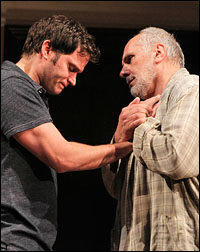
Tony Kushner has labored long and mightily and summoned forth a new work — his first brand new play since Caroline, or Change nine years ago — and he glibly calls it iHo, mercy-killing its unabridged, marathon handle, The Intelligent Homosexual's Guide to Capitalism and Socialism With a Key to the Scriptures. A good four years in the writing, it officially opened for Public Theater exhibition on May 5.
Set in 2007, the play centers on Gus Marcantonio (Michael Cristofer), a retired, 73-year-old longshoreman who has been active his whole life in union politics — and the Communist Party. To the family brownstone in Brooklyn he calls his three adult children (Stephen Spinella, Linda Emond and Steven Pasquale) and his activist sister (Brenda Wehle) to tell them he's considering suicide. "Basically, that's the play," says Kushner. "It sounds grim, but it actually isn't all that grim."
Given the to-off-or-not-to-off premise, another 'night, Mother would seem to be dawning — but that's not the case, says Michael Greif, who has been directing iHo since its initial lift-off at Minneapolis' Guthrie Theatre in the spring of '09 (though he took a break in the middle for an epic revival of Kushner's Angels in America for Off-Broadway's Signature Theatre).
"As you can imagine, there are passionate and heated discussions and interactions with the family," Greif concedes, "but I think that this play is probably more like Long Day's Journey Into Night than it is like 'night, Mother."
Which, fortuitously, is how Kushner sees it: "I feel this was a conscious attempt on my part to explore the kinds of plays that are thought of as being the pillars of American dramatic writing — Long Day's Journey Into Night, Death of a Salesman, A Streetcar Named Desire — in the sense that these are plays that are powerfully about family. I'm 54 now. When I started iHo, I was about 50. I was curious to investigate that dynamic — to really have a chance to think about families on stage. It's been a wonderful journey, and I'm pleased with the way the play both resembles its antecedents and doesn't." Through rewrites, Greif has seen this family grow in depth since they started arriving at the Guthrie. "I have spent a lot of time with them, and they are thrillingly fascinating, complicated people," he says. "They join other spectacular Kushner characters that we know well and that I've also spent some time with earlier this year. They're an extraordinarily articulate, incredibly passionate bunch.
 |
||
| Steven Pasquale and Michael Cristofer in The Intelligent Homosexual's Guide to Capitalism and Socialism With a Key to the Scriptures. |
||
| photo by Joan Marcus |
The title came first with Kushner. His grandmother died at 101 a very learned lady with a large library, and when he was packing up her books, he came across a long prose essay called "The Intelligent Woman's Guide to Socialism and Capitalism." Says Kushner, "I loved the title, played around with it and used it as lecture titles and various things."
Then came the personnel. "My original impulse was to write a play for Stephen [Spinella] and Linda [Emond] — that's what interested me. I always wanted to see them on stage together.
"Stephen is one of my oldest friends. We met in NYU Graduate School in 1981. The very first things I ever wrote that I consider an attempt to be a writer, I wrote for Stephen. He's my ideal of an actor.
"When Signature asked about doing Angels as part of the season, we talked about what the new play would be, and iHo felt interesting because it's the first play about explicitly gay material I've done since Angels, and of course I wrote Prior Walter [in Angels] for Stephen." Spinella is the only person in history to win two Tony Awards for the same role, and Kushner won two as well (for both parts of Angels in America). "Linda and I had a remarkable time when we did Homebody/Kabul. I've always wanted to work with her again.
"The play began in earnest around the time the Writers Guild went on strike and I was in picket lines...it was also when the stagehands struck. I heard a lot of talk, from people I expected to have different politics, saying, 'Why should they make all that money?' and 'If we don't need them backstage, why should we be paying them?' and 'They make theatre unaffordable.' That felt to me like evidence of how deeply the anti-union logic of Reaganism had permeated our culture."
Best gird yourself for some political rough-and-tumble at this family picnic.
Director's Cut: Michael Greif and Tony Kushner on iHo, Part 1:










